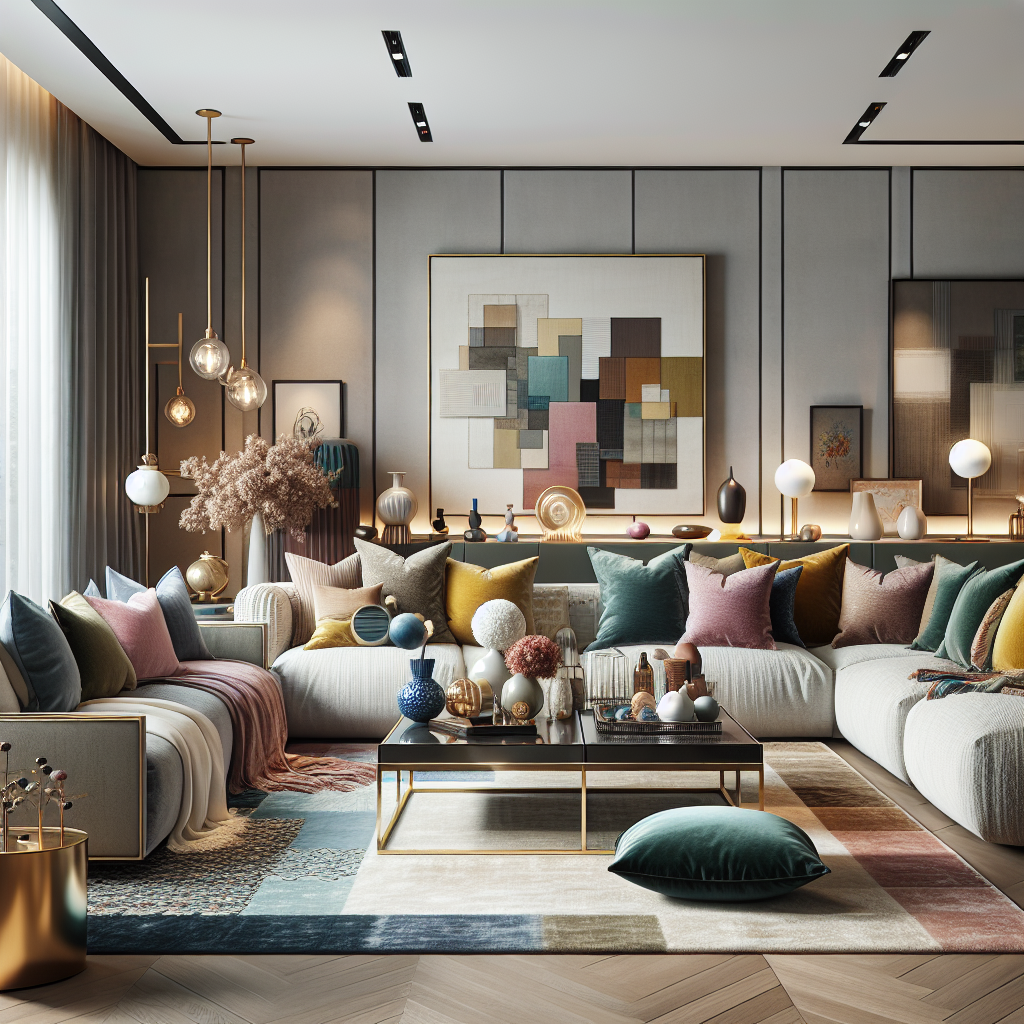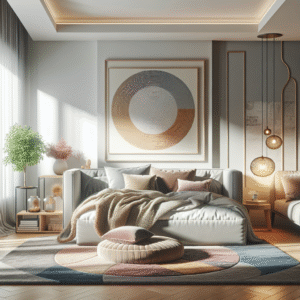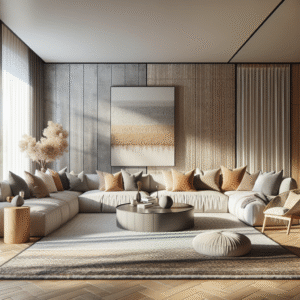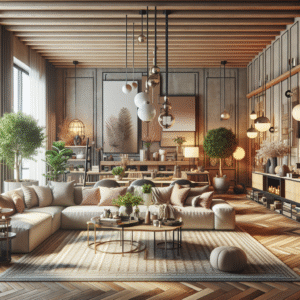Color Confidence: Achieving Perfect Balance in Living Room Decor
Are you overwhelmed when choosing colors for your living room? You’re not alone! Many struggle to find that perfect balance that brings harmony to their space. In this article, we’ll guide you to achieving color confidence in your living room decor. You’ll discover strategies to select colors that align with your style, create mood-enhancing atmospheres, and establish a harmonious flow in your home.
Throughout this guide, you’ll learn how to assess your needs, leverage color theory, and implement practical decorating techniques for a stunning living room. By the end, you will walk away with actionable insights and your dream space in mind.
Understanding Color Theory in Decor
Before diving into color selection, it’s crucial to grasp the basics of color theory. This foundational knowledge will prepare you for informed decisions.
The Color Wheel
The color wheel consists of primary, secondary, and tertiary colors. Understanding how colors relate informs your design choices:
- Primary Colors: Red, blue, yellow
- Secondary Colors: Green, orange, purple
- Tertiary Colors: Combinations of primary and secondary colors.
Color Relationships
Color relationships involve how colors interact:
- Complementary: Opposing colors on the wheel (e.g., blue and orange)
- Analogous: Colors next to each other (e.g., blue, teal, and green)
- Triadic: Three evenly spaced colors (e.g., red, yellow, blue)
Choosing Your Perfect Palette
Now that you understand color theory, let’s explore how to develop a palette that reflects your personality and meets your functional needs.
Assessing Your Space
Start by examining your living room. Consider:
- The size of your space
- The amount of natural light
- The existing furniture and accessories
Write down what you want to achieve. Do you want a cozy, intimate feeling or a bright, airy atmosphere?
Color Psychology
Colors evoke emotions and influence behavior. Here’s a quick overview:
- Blue: Calming and soothing
- Yellow: Cheerful and energetic
- Green: Refreshing and revitalizing
- Red: Bold and stimulating
- Neutrals: Balanced and timeless
Choose colors that resonate with the atmosphere you desire in your living room.
Implementing Your Color Palette
With a well-assessed space and chosen colors, it’s time to execute your design plan.
Accent Walls
Consider painting one wall a bold color while keeping others neutral. This method draws attention and creates a striking focal point.
Textiles and Accessories
Use textiles like cushions, rugs, and curtains to incorporate your color palette into the decor without overwhelming the space. Mix and match patterns and textures for added depth.
Art and Decor Items
Don’t forget wall art and decorative elements! Choose pieces that incorporate your color scheme for a cohesive look.
Harmonizing with Lighting
Lighting plays a key role in how colors appear. Explore different types of lighting:
Natural Light
Assess how sunlight impacts your space throughout the day. Natural light can make colors appear cooler or warmer based on the time of day.
Artificial Lighting
Use warm-toned bulbs for a cozy feel or cooler bulbs for an energetic ambiance. Mixing different types of lighting can enhance your color palette significantly.
Case Studies: Success Stories
To illustrate these techniques, let’s explore a few real-world applications of color theory in living room decor.
Case Study 1: The Cozy Retreat
A family chose a warm color palette of earthy tones to create a soothing atmosphere. They implemented soft textures and layered lighting to enhance the effect. The final result was a comfortable, inviting living space.
Case Study 2: The Bright Oasis
Another homeowner opted for a vibrant palette with bold colors. Accent walls paired with playful textiles made the space feel alive, while strategically placed plants added a refreshing element.
Common Mistakes to Avoid
Even experienced decorators can make errors. Here are some common pitfalls:
- Overusing Bold Colors: Too much can overwhelm the senses.
- Lack of Cohesion: Ensure a common thread runs through your color palette.
- Ignoring the Light: Always consider how your colors change with lighting.
Conclusion: Your Path to Color Confidence
Achieving color confidence in your living room decor involves understanding color theory, choosing the right palette, and implementing it effectively. Remember, balance is key! As you embark on this decorating journey, keep your desired atmosphere at the forefront of your mind.
Now that you have the tools, it’s time to bring your vision to life. Start small if needed, and don’t be afraid to experiment!
Ready to transform your living space? Explore our related content on home decor and color theory!
FAQ Section
What are the best colors for a small living room?
Light colors like whites, soft grays, and pastels can make a small living room feel larger and airier.
How can I make my dark living room feel brighter?
Use mirrors, lighter furniture, and bright decor accents to reflect light and give the illusion of a brighter space.
What’s the best way to choose a color palette?
Start by assessing the existing elements in your room, consider the atmosphere you wish to create, and refer to the color wheel for balance.
Can I mix different color styles?
Yes, but strive for cohesion by selecting a common color base that ties all elements together.
How do I know if my colors are complementary?
Use the color wheel; complementary colors are opposite each other, enhancing each other’s vibrancy.
Content Disclaimer
Information provided in this article is for educational purposes only. Please consult a professional for personalized advice.
Categories
- Accent Walls & Ceilings (38)
- Art Curation & Gallery (52)
- Bedding Style Trends (48)
- Bedroom Makeover (56)
- Bohemian & Eclectic Styles (38)
- DIY & Budget-Friendly Decor (39)
- Eco-Friendly Design (37)
- Furniture Care (58)
- Home Decor & Design Ideas (128)
- Home Wellness Spaces (37)
- Integrated Outdoor Living (36)
- Kids and Nursery Decor (39)
- Living Room Decor (57)
- Minimalist & Japandi Style (39)
- Mix & Match Techniques (55)
- Modern & Contemporary Design (37)
- Rug Sizing & Placement (56)
- Seasonal Home Decor (60)
- Small Space Solutions (42)
- Wall Art & Painting Tips (59)
Recent Comments
Archives
Product Gallery
-
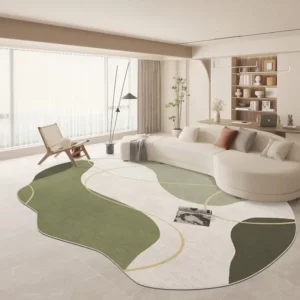 Large Area Green Rugs for Bedroom Nordic Living Room Decoration Shaped Carpet Irregular Plush Lounge Rug Home Thick Washable Mat
Rated 5.00 out of 5$52.27 – $329.62Price range: $52.27 through $329.62
Large Area Green Rugs for Bedroom Nordic Living Room Decoration Shaped Carpet Irregular Plush Lounge Rug Home Thick Washable Mat
Rated 5.00 out of 5$52.27 – $329.62Price range: $52.27 through $329.62 -
 Nordic Style Rugs for Bedroom Morandi Living Room Decoration Carpet Large Area Geometry Lounge Rug Home Cloakroom Non-slip Mat
Rated 5.00 out of 5$37.55 – $568.70Price range: $37.55 through $568.70
Nordic Style Rugs for Bedroom Morandi Living Room Decoration Carpet Large Area Geometry Lounge Rug Home Cloakroom Non-slip Mat
Rated 5.00 out of 5$37.55 – $568.70Price range: $37.55 through $568.70 -
 Irregular Shapes Living Room Decoration Carpet Modern Style Rugs for Bedroom Home Thicken Plush Rug Fluffy Soft Lounge Floor Mat
Rated 4.75 out of 5$53.13 – $330.53Price range: $53.13 through $330.53
Irregular Shapes Living Room Decoration Carpet Modern Style Rugs for Bedroom Home Thicken Plush Rug Fluffy Soft Lounge Floor Mat
Rated 4.75 out of 5$53.13 – $330.53Price range: $53.13 through $330.53

